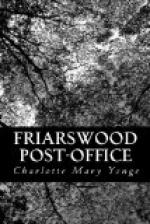Little Miss Jane, the orphan whom the Colonel and Mrs. Selby had left to be brought up by her grandmother, had a great fancy that Alfred should be a page; and as she generally had her own way, he went up to the Grange when he was about thirteen years old, and put on a suit thickly sown with buttons. But ere the gloss of his new jacket had begun to wear off, he had broken four wine-glasses, three cups, and a decanter, all from not knowing where he was going; he had put sugar instead of salt into the salt-cellars at the housekeeper’s dining-table, that he might see what she would say; and he had been caught dressing up Miss Jane’s Skye terrier in one of the butler’s clean cravats; so, though Puck, the aforesaid terrier, liked him better than any other person, Miss Jane not excepted, a regular complaint went up of him to my Lady, and he was sent home. He was abashed, and sorry to have vexed mother and disappointed Miss Jane; but somehow he could not be unhappy when he had Harold to play with him again, and he could halloo as loud as they pleased, and stamp about in the garden, instead of being always in mind to walk softly.
There was the pony too! A new arrangement had just been made, that the Friarswood letters should be fetched from Elbury every morning, and then left at the various houses of the large straggling district that depended on that post-office. All letters from thence must be in the post before five o’clock, at which time they were to be sent in to Elbury. The post-master at Elbury asked if Mrs. King’s sons could undertake this; and accordingly she made a great effort, and bought a small shaggy forest pony, whom the boys called ‘Peggy,’ and loved not much less than their sisters.
It was all very well in the summer to take those two rides in the cool of the morning and evening; but when winter came on, and Alfred had to start for Elbury in the tardy dawn of a frosty morning, or still worse, in the gloom of a wet one, he did not like it at all. He used to ride in looking blue and purple with the chill; and though he went as close to the fire as possible, and steamed like the tea-kettle while he ate his breakfast and his mother sorted the letters, he had not time to warm himself thoroughly before he had to ride off to leave them—two miles further altogether; for besides the bag for the Grange, and all the letters for the Rectory, and for the farmers, there was a young gentlemen’s school at a great old lonely house, called Ragglesford, at the end of a very long dreary lane; and many a day Alfred would have given something if those boys’ relations would only have been so good as, with one consent, to leave them without letters.
It would not have mattered if Alfred had been a stouter boy; but his mother had always thought he had his poor father’s constitution, and therefore wished him to be more in the house; but his idleness had prevented his keeping any such place. It might have been the cold and wet, or, as Alfred thought, it might have been the strain he gave himself one day when he was sliding on the ice and had a fall; but one morning he came in from Elbury very pale, and hobbling, as he said his hip hurt him so much, that Harold must take the letters round for him.




